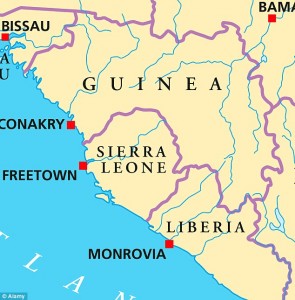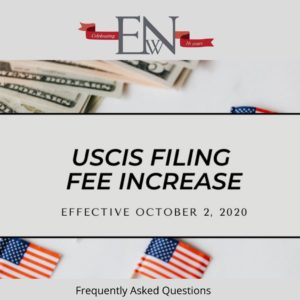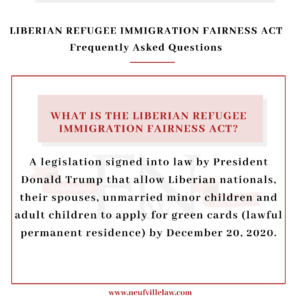On November 20, 2014, Secretary of Homeland Security Jeh Johnson announced the designation of the three West African countries affected by the Ebola virus disease for Temporary Protected Status (TPS) for a period of 18 months. Eligible nationals of Liberia, Guinea and Sierra Leone who are currently residing in the United States may apply for TPS with the United States Citizenship and Immigration Services (USCIS).
The following are answers to a few frequently asked questions about the Department’s Temporary Protected Status designations for nationals of Liberia, Guinea and Sierra Leone:
- What is TPS? TPS is a statutory provision in the Immigration and Nationality Act that allows the Secretary of Homeland Security to designate a foreign country for TPS due to conditions in the country that temporarily prevent the country’s nationals from returning safely, or in certain circumstances, where the country is unable to handle the return of its nationals adequately.
- Do all nationals of Liberia, Guinea and Sierra Leone qualify for TPS? All nationals to Liberia, Guinea and Sierra Leone, who meet the following criteria are eligible to apply for TPS benefits:
- Applicants must be a national of either Liberia, Guinea or Sierra Leone;
- Applicants must have continuous physical presence in the United States since November 21, 2014;
- Applicants must have continuously resided in the United States since November 20, 2014;
- Applicants must not have any statutory bars that would prevent them from receiving TPS, i.e. certain criminal convictions, terrorism bars, etc.;
- If there are any statutory bars that would prevent applicants from obtaining TPS benefits, applicants must file a waiver of inadmissibility, and
- Applicants must apply and register for TPS.
- What are the benefits of receiving a grant of TPS? During the designated period, TPS recipients or those who are found to be eligible for TPS upon initial review can not be deported from the United States, can obtain a work permit and may be granted travel authorization (Advance Parole). Once TPS is granted, an individual cannot be detained by the DHS on the basis of his or her immigration status in the United States.
- Can I obtain lawful permanent residence (“green card”) as a result of TPS? TPS is only a temporary benefit and does not automatically lead to a green card or give the recipient any other immigration status.
- If I obtain TPS, will I be considered to be “in lawful status” for purposes of applying for adjustment of status (“green card”) based on an approved or pending immigrant petition? In accordance with the Immigration and Nationality Act Section 244(f)(4), for “purposes of adjustment of status under section 245 and change of status under section 248, the alien shall be considered as being in, and maintaining, lawful status as a nonimmigrant. “
- If I already hold a valid non-immigrant status or have a pending application for asylum or other immigration benefits, can I apply for TPS? Obtaining TPS does not require the relinquishing of any nonimmigrant or other status that you may have or the execution of any waiver of any other rights. Obtaining TPS also does not prevent you from doing the following: 1) applying for nonimmigrant status; 2) filing for adjustment of status based on an immigrant petition; and 3) Applying for any other immigration benefit or protection for which you may be eligible for.
- If I obtain TPS, can I travel out of the United States and return? As a TPS recipient, you may apply for a travel document, which is referred to as advance parole. Advance parole is a procedure by which DHS may authorize, as a matter of discretion, an individual to travel abroad with advance authorization to be considered for parole into the United States upon return. DHS will now issue written legal guidance to clarify that in all cases when an individual leaves the United States pursuant to a grant of advance parole, that individual will not be considered to have made a “departure” that would trigger the bars that may prevent a person who was previously out of status from returning or entering to the United States.
- I am a Liberian and I am currently on Deferred Enforced Departure. Should I apply for TPS? DHS strongly encourages and advises Liberian nationals currently on DED to apply for TPS. If they do not apply for TPS within the initial 180-day registration period, they risk being ineligible for TPS because they will have missed the initial registration period. Liberians covered by DED who already possess or have applied for a work permit do not need to also apply for one related to this TPS designation. However, such individuals who are granted TPS may request a TPS-related work permit at a later date as long as the TPS designation for Liberia remains in effect.
- What are the forms and fees associated with applying for TPS?
- Filing Fee for Form I-821, Application for TPS: $50.00
- Filing for Work Permit (I-765), if you decide that you want a work permit based on TPS? $380.00
- TPS Biometrics Fee: $85.00
Disclaimer: The blogs of Law Office of Edward W. Neufville, III, LLC, are offered only for general informational and educational purposes. They are not offered as and do not constitute legal advice or legal opinions. You should not act or rely on any information contained in this website without first seeking the advice of an experienced, competent and licensed United States immigration attorney.


















No comments yet.